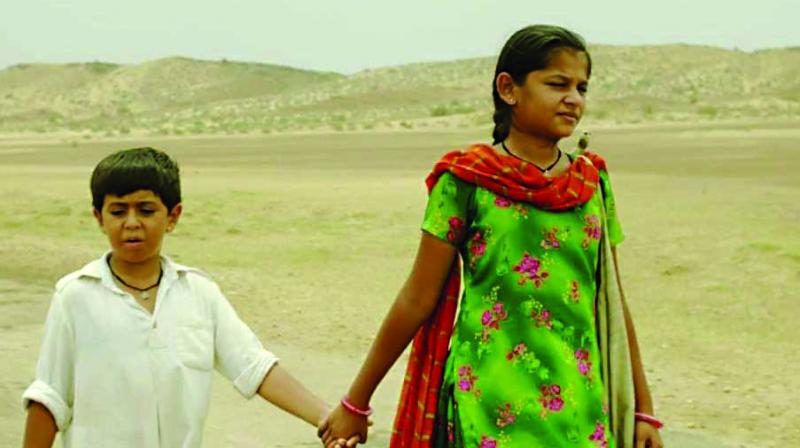Dhanak movie review: A charming film about the power of love & SRK
The film is shot beautifully and the film's two little stars are very fine actors.

Cast: Hetal Gada, Krrish Chhabria, Rajiv Lakshman, Vipin Sharma, Flora Saini
Director: Nagesh Kukunoor
Nagesh Kukunoor sits in a unique slot of his own making. He’s an interesting and promising director despite the fact that, for the last 10 years, he has always disappointed. Sometimes a lot, sometimes less. This time, thankfully, it’s less. His Dhanak (Kukunoor has written and directed it), set in the formidable, punishing landscape of Rajasthan, tells the story of small people and their big love. Kukunoor tells this story sweetly, poignantly till he and his film both drop down the Stupid Hole.
That happens later in the film, and it happens more than once. Yet, despite those moments, Dhanak is a charming and accomplished film. Life, it seems, contorted itself, as if in a conspiracy to test little Pari and even littler Chhotu’s resolve to live and be happy, and then threw them out of its spiteful innards. Pari (Hetal Gada) is a child herself. Yet circumstances have cast her in the role of mother-best friend to her younger brother Chhotu (Krrish Chhabria) who is eight and blind. She’s more than happy to play that role.
Pari and Chhotu turn their shared misfortune into a sort of umbilical chord — Pari always ahead, leading the charge into the world while clasping Chhotu’s hand, or holding the dupatta tied around his waist whose one end she holds firmly, guiding and gently pulling him along. Theirs is not a solemn relationship burdened by a sense duty. It’s light and silly and real.
They argue, fight, share their thoughts, food, and every day, on the way to school, they flip a coin to decide whose turn it is — Salman Khan or Shah Rukh Khan. Pari and Chhotu harbour fierce loyalties to their heroes. He to Salman, she to Shah Rukh. And after the coin decides whose turn it is, both banter about the superior special powers of their favourite star and then, as they start walking, the story session begins. Whoever wins is ecstatic, because it’s a jam session where the sulking other must fill in appropriate bits in the blanks.
Though one of them is always irritated and bored, they always play along, not just in the hope that tomorrow it may be their chance, but because that’s the code of their relationship — they’ll stick together, no matter what. Recounting stories of the few films they have watched with their loving but weak Chacha despite the constant cribbing of their Chachi who doesn’t like that she has to take care of two orphans is a life-affirming escape for them.
Chhotu, quite like his hero, gets gussa easily and calls his Chachi chudail and is always ready for a fight. He doesn’t think of his blindness as a vulnerability because Pari is always around. But Pari is worried. Chhotu will turn 9 soon, in two months, and she has to fulfil her promise — to make him see dhanak, rainbow, at night. Then, at one film outing, she sees a poster of Shah Rukh Khan promoting netra daan. And then she hears that SRK is shooting just 300 kms away, in Jaisalmer.
As their road journey to meet SRK the messiah begins through Rajasthan’s dry, single-tone landscape, the story of why they are living with their Chacha-Chachi emerges. Dhanak — a voyage of love, hope and determination — works because of two things. The film is shot beautifully and the film’s two little stars are very fine actors.
Despite the fact that the road journey at times turns into Rajasthan cultural tourism, the film has been shot beautifully. The expansive landscape with a daunting horizon — stunning, intimidating and harsh without relief — pulls you in.
Chitranjan Das’ camerawork makes this land — with a mingy dash of green here and there —so tangible that I could sense grit in my mouth and had the urge to rub cream on my hands. And then there’s Hetal Gada and Krrish Chhabria.
Hetal, gifted and outstanding, never misses a beat or steps out of her character. She’s sharp, focused and yet keeps Pari light and real. Krrish is packed with cuteness and plays “blind” like few of our stars can. He is often given big dialogue and he tackles them like a pro, never once sinking into precociousness. Best part is their chemistry — it’s crackling and heart-warming. The problem with Dhanak is that every time the film moves away from them, it drops down the Stupid Hole to ram into contrived fairytale characters. This happens a lot in the second half.
In the first half the film very casually shows us how life’s little bumps must be dealt with — not as deeply tragic and life-altering episodes, but stuff that’s par for the course of life. Though the threat of evil people and life’s meanness hovers, accentuated by our own fear for these two kids roaming the dustbowl alone, Kukunoor keeps it all light. It’s the saviours he makes deep and meaningful and very annoying. From the prophesying blind old woman to the free-spirited hippie called Douglas Adams, from the divine Mataji to the mad man, despite a few interesting moments, they are all lifeless cutouts from fairytales.
The evil ones, who seem to be creatures who dwell above ground, are more real.
Despite these glitches Dhanak, which pins its hopes on Bollywood and its hero, is a lovely film. Because it’s a story not just about love and hope, but about the strange comfort and strength that knowing how much the other loves you brings.

